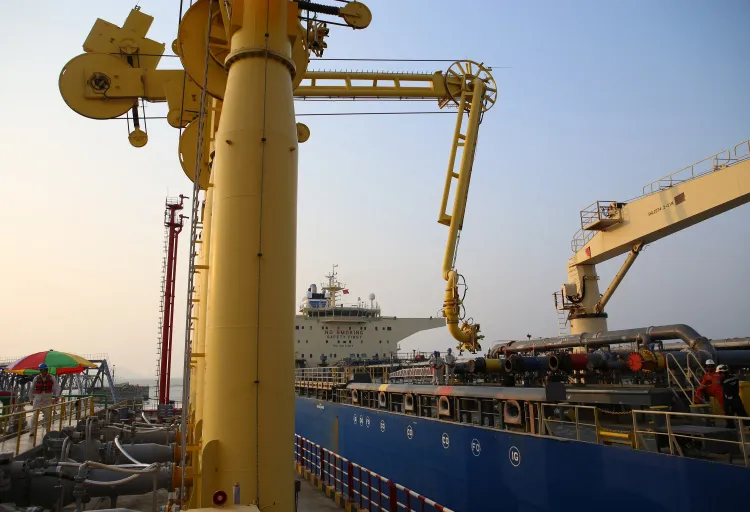Why Are Oil Prices Surging Amid the Mideast Crisis?

Synopsis
Key Takeaways
- Oil prices have reached a five-month peak amid escalating tensions.
- US military actions against Iran have heightened supply concerns.
- India reassures consumers of adequate fuel supplies despite rising prices.
- Strategic reserves and diversified imports are key to India's energy security.
- Geopolitical developments will continue to influence global oil markets.
New Delhi, June 23 (NationPress) Oil prices have soared to their highest point since January, following recent US military actions targeting nuclear facilities in Iran. This has prompted threats from Iran regarding the potential closure of the Strait of Hormuz, a critical passage for approximately 20 percent of the world's crude oil supply.
On Monday morning, Brent crude futures increased by $1.92, or 2.49 percent, reaching $78.93 per barrel. Meanwhile, US West Texas Intermediate crude rose $1.89, or 2.56 percent, to $75.73.
Although Brent crude prices initially jumped by as much as 5 percent, they quickly retreated from those highs.
This marks the third consecutive week of rising crude oil prices, driven by escalating geopolitical tensions and an unexpected drop in US oil inventories.
The ongoing conflict between Israel and Iran has intensified concerns about supply stability in the Middle East, a region vital for global oil exports.
According to the US Energy Information Administration (EIA), crude oil reserves fell by 11.5 million barrels last week, far exceeding the projected decline of 2.3 million barrels.
“Crude oil is expected to find support at $74.20-$73.40, with resistance at $75.65-$76.20 during today’s trading. In Indian rupees, support lies at Rs 6,400-6,320, while resistance is at Rs 6,580-6,690,” explained Rahul Kalantri, VP of Commodities at Mehta Equities Ltd.
Despite the looming threat of the Hormuz Strait's closure, it is crucial to recognize that this has historically been a mere threat and has never actually occurred.
“The closure of the Hormuz Strait would ultimately harm Iran and its ally China more than anyone else,” stated VK Vijayakumar, Chief Investment Strategist at Geojit Investments Limited.
In response, Minister of Petroleum and Natural Gas, Hardeep Singh Puri, has sought to reassure Indian consumers regarding the stability of oil supplies amidst the Israel-Iran conflict and rising geopolitical tensions following the US strikes on Iranian nuclear sites.
“We have been monitoring the evolving situation in the Middle East closely for the past two weeks. Under Prime Minister Narendra Modi’s leadership, we have diversified our oil sources, and a significant portion of our supply no longer passes through the Strait of Hormuz,” the minister mentioned.
He highlighted that India's oil marketing companies, such as Indian Oil, Bharat Petroleum, and Hindustan Petroleum, possess several weeks' worth of supply and continue to receive energy from multiple routes.
“We will take all necessary measures to ensure fuel supply stability for our citizens,” the minister assured.
India imports about 85 percent of its crude oil needs, and rising prices can inflate the oil import bill and increase inflation, adversely impacting economic growth.
However, India has bolstered its oil supply resilience by increasing imports from Russia and the US, alongside establishing strategic reserves.








